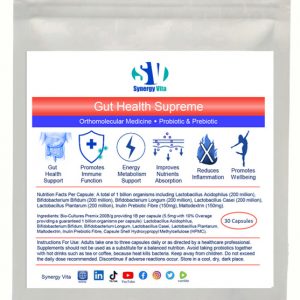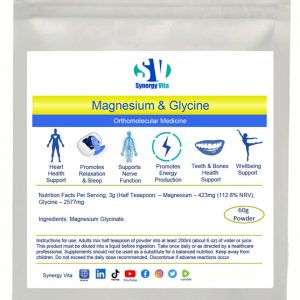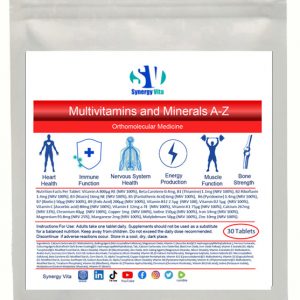Benefits of Immune System Enhancer – Vitamin C, Vitamin D3 & Zinc Formula
Strengthens the immune system
Protection of DNA, proteins & lipids from oxidative damage
Promotes collagen formation, & teeth, gums & skin health
Improves pollutants detoxification
Calcium & phosphorous metabolism support
Regulates cell growth & differentiation
Promotes strong bones
Combats inflammation & autoimmune diseases
Maintenance of healthy hair & nails
Reproductive system health support
Promotes energy-yielding metabolism
Supports cognitive function
Nutrition Facts per Capsule: Vitamin C 600mg (750% NRV), Vitamin D3 5000UI (2400% NRV), Zinc 12.3mg (123% NRV).
Ingredients: Ascorbic Acid, Cholecalciferol, Zinc Citrate, Hydroxypropyl Cellulose, Magnesium Stearate.
Instructions for use: Adults take one capsule daily or as directed by a healthcare professional.
IMPORTANCE OF KEEPING THE IMMUNE SYSTEM STRONG
The immune system plays a critical role in protecting the body from a bewildering array of infectious agents of diverse shape, size and composition. The immune system comprises a network of specialised cells, organs and specific proteins that work in concert to defend the body against attacks by bacteria, viruses, parasites and fungi. Moreover, the immune system plays a role of fundamental importance in protecting the body from harmful substances, and also helps to repair damage caused by noxious insult from external factors, such as environmental pollutants, as well as from cell changes, which could cause diseases, such as cancer. Maintaining an efficient and strong immune system is critical for health and survival. The immune system must constantly monitor for signs of invasion of pathogens and danger. The immune system comprises different immune cells, including monocytes, lymphocytes, macrophages, natural killer cells, neutrophils, basophils and eosinophils. Normal function of the immune system requires certain micronutrients, including vitamin C, vitamin D and Zinc.
IMPORTANCE OF VITAMIN C FOR IMMUNE FUNCTION
Ascorbic acid, commonly known as vitamin C, is a water-soluble micronutrient. The results from a number of studies provided scientific evidence that vitamin C is a critical nutrient for enhancing various aspects of immune function.
Immune cells such as monocytes and neutrophils, accumulate large amount of vitamin C, this accumulation into neutrophils, especially following activation of their oxidative burst, is thought to protect these immune cells from oxidative damage. Vitamin C is a powerful antioxidant, capable of scavenging many reactive oxidants and can also regenerate the antioxidants glutathione and vitamin E. It appears that upon phagocytosis, vitamin C is depleted from neutrophils in an oxidant-dependent manner.
The mobility of neutrophils can be inhibited by oxidants, probably as a result of alterations of lipids and membrane fluidity. Administration of this vitamin improves neutrophils mobility, which can be attributed to the antioxidant effect of this micronutrient. Thus, the immunomodulatory effects of vitamin C can be achieved via regulation of redox-sensitive cell signalling pathways or by directly protecting essential cell structural components from oxidative damage.
Research has shown that vitamin C deficiency may impact on the ability of phagocytes to migrate to the sites of infection. Patients with severe infection exhibit compromised neutrophil chemotactic ability, and vitamin C depletion that is prevalent during severe infection, may contribute to this observation. However, impaired leukocyte chemotaxis can be restored with high doses of vitamin C supplementation.
High dose of vitamin C in healthy individuals enhances neutrophil chemotactic ability, which is correlated with the antihistamine effect of vitamin C. Moreover, vitamin C supplementation resulted in a 20% increase in neutrophil chemotaxis. Similarly, vitamin C supplementation in elderly women, in combination with vitamin E, enhanced neutrophil functions, including chemotaxis.
There is evidence to suggest that both B- and T-lymphocytes accumulate vitamin C to high levels, which is probably for antioxidant protection of these immune cells. Furthermore, vitamin C appears to promote lymphocytes proliferation, leading to enhanced antibody production. Also, vitamin C may have a central role in developmental differentiation and maturation of immature T-cells, and natural killer cells. In elderly individuals, the administration of vitamin C also enhances ex vivo lymphocyte proliferation. Exposure to toxic compounds can impair the function of lymphocytes, which can be restored to normal levels following supplementation of vitamin C.
The results from both human and animal studies suggest that vitamin C supplementation is capable of lowering histamine levels, and thus helping combat allergies.
Respiratory infections, including pulmonary tuberculosis and pneumonia, are associated with decreased plasma vitamin C concentrations. Vitamin C administration returns plasma vitamin C levels to normal and ameliorates the severity of the respiratory symptoms. Chest X-rays have shown rapid clearance of lung infections following administration of vitamin C. Pre-clinical studies of animals with sepsis-induced lung injury have shown that administration of vitamin C may improve alveolar fluid clearance, as well as enhancing bronchoalveolar epithelial barrier function, and attenuating sequestration of neutrophils. These factors are vital for normal lung function.
Daily vitamin C supplementation is efficacious in decreasing the incidence, and ameliorating the severity and duration of the common cold. Also, vitamin C supplementation in cases of inadequate vitamin C status reduces the incidence of the common cold. Moreover, vitamin C administration can improve recovery from common cold, and improve symptoms and duration of pneumonia. Prophylactic administration of vitamin C decreases the risk of developing more serious respiratory infections, such as pneumonia.
The results from these studies demonstrate that vitamin C has a multitude of beneficial effects on cellular functions of both the innate and adaptive immune system, and vitamin C supplementation increases the daily intake of this nutrient, which improves immune function. Thus, supplementing this key nutrient is beneficial for the general population, especially the elderly, individuals with inadequate vitamin C status, and in cases of infection and/or elevated oxidative stress.
IMPORTANCE OF VITAMIN D FOR IMMUNE FUNCTION
Vitamin D3 is a fat-soluble vitamin with numerous biological functions. Vitamin D deficiency is quite common in many countries worldwide, and consequently, dietary supplements are necessary. Research has revealed that low levels of vitamin D are associated with impaired immune function. Tuberculosis, a bacterial infection that effects the lungs, was treated with cod liver oil that is rich in vitamin D. This provided evidence that vitamin D represents an important stimulant for innate immunity. Other investigations provided new insights into how vitamin D enhances the antimicrobial effects of monocytes and macrophages, which are important effector immune cells, fighting against pathogens such as Mycobacterium tuberculosis. Vitamin D is involved in gene expression and helps activates the transcription of antimicrobial substances.
Low vitamin D blood concentrations are associated with elevated mortality caused by severe infections in end-stage renal disease patients, upper respiratory tract infections, including influenza, chronic obstructive pulmonary disease and allergic asthma. In a randomised controlled trial (RTC), the use of vitamin D fortified milk in severely deficient children, reduced significantly the number of acute respiratory tract infections. In another RCT, vitamin D was administered to 140 immunodeficient patients for one year. This decreased significantly infectious symptoms and the total number of specific pathogens in the nasal fluid, and also reduced the use of antibiotics.
Vitamin D on human adaptive immune cells influences the expression of certain genes involved in the proliferation, differentiation of both T- and B lymphocytes. Vitamin D also affects enzyme activity in these immune cells. It appears that vitamin D is involved in the control of B cell activation and proliferation, which clinically is important in autoimmune diseases, as B-cells producing autoreactive antibodies play a major role in the pathophysiology of autoimmunity. Also, there is evidence to suggest that vitamin D is important for combatting viral infections.
IMPORTANCE OF ZINC FOR IMMUNE FUNCTION
Zinc is an essential mineral for living organisms, across species. In humans, growth and development are strictly dependent on this essential nutrient. It appears that zinc is a cofactor for more than 300 enzymes.
It is well established that zinc is essential for the function of both the innate and adaptive immune system, and is crucial even in the earliest stages of an immune response recruitment. In vivo, deficiency of zinc not only effects the recruitment of neutrophils but also reduces the chemotaxis of these immune cells. Moreover, zinc deficiency results in impaired natural killer cells activity, phagocytosis of macrophages and neutrophils, and generation of oxidative burst. Zinc is required to maintain the normal function of natural killer cells, and its deficiency can result in functional loss. The proliferation of the immune cells depends on this important nutrient, and also the inhibition of pathogens proliferation is zinc-dependent.
Zinc is a cofactor for the hormone thymulin, secreted by the thymus gland, which induces markers of differentiation in immature T-cells. Moreover, thymulin also modulates cytokines release by peripheral blood nonnuclear cells (PBMC) and induces proliferation of CD8 T-cells in combination with interleukin 2. Zinc deficiency is associated with changes in the thymus and decreased T-cells proliferation, which can be reversed by zinc supplementation. This essential micronutrient is involved in immunoregulation, including the release of different cytokines.
Low serum zinc levels alter normal T-cell functions, and also some autoimmune diseases with a T-cell pathology, such as rheumatoid arthritis, are linked with zinc deficiency, and zinc supplementation is advantageous in some cases. Zinc affects gene expression by structural stabilisation and functional regulation of different immunologically-relevant transcription factors.
Zinc represents an essential mineral for combatting viral infections, however, deficiency of this nutrient is strikingly common. Importantly, zinc treatment administered at a therapeutic dose has the potential to improve significantly the clearance of both chronic and acute viral infections, and their accompanying symptoms and pathologies. Zinc supplementation improves immune function and antiviral response, as well as inhibiting viral replication or infection-related symptoms. It is extremely important to consider that deficiency of zinc lead to impairment of different immune functions, which can be completely restored by supplementation of zinc.
BECOMING NUTRIENT DEFICIENT IS EASY AND MORE COMMON THAN YOU THINK
Suboptimal or deficiency of micronutrients is a very common problem, with adverse effects on health and wellbeing. The factor that contribute to inadequate levels of nutrients include:
- Soil impoverishment (less amount of micronutrients)
- Food processing (micronutrients are removed)
- Infection (increased need of micronutrients to combat disease)
- Reduced absorption because of gastrointestinal conditions
- Toxic substances use (they reduce bioavailability and they deplete micronutrients)
- Inflammation (elevated requirements of micronutrients)
- Injury (increased needs for micronutrients)
- Environmental toxicity (they reduce bioavailability and they deplete micronutrients)
- Age (reduced absorption of micronutrients)
- Oxidative stress (increased requirements of micronutrients)
- Alcohol consumption (increased excretion of micronutrients)
- Physical activity (increased need for micronutrients)
- Fighting disease (increased requirements of micronutrients)
- Microbiome alterations (altered absorption of micronutrients)
- Genetic polymorphism (impaired absorption and utilisation of micronutrients)
WHY CHOOSE SYNERGY VITA IMMUNE SYSTEM ENHANCER FORMULA?
Synergy Vita Immune System Enhancer top-notch formula is made with a blend of vitamins and minerals. We have blended them in a formula so you can get the most of these active ingredients and thrive.
All Synergy Vita products have high purity and are created using the highest quality of production, so you can get the most of the active ingredients and thrive.
The manufacturing facilities are based in the UK, with highly professional staff that produce superior Orthomolecular Medicine products to support health and promote wellness. Our products are packaged to avoid plastic waste.
DECADES OF RESEARCH & EXPERIENCE
Synergy Vita products on scientific evidence. Our physiologist PhD, conducts extensive research to identify natural solutions for optimising physiological functions to help individuals stay fit and healthy.
If optimising nutrients intake with premium quality products is important to you, you’re in the right place!





Reviews
There are no reviews yet.